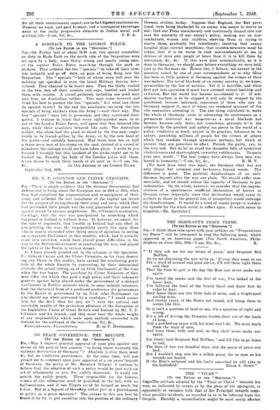NO PEACE CONFERENCE: THE BOYCOTT. (To THE EDITOR OF THE
" SPECTATOR.") it,—May I express grateful approval of your plea against any desire on the part of this country " to bring about wantonly the National destruction of Germany" ? Absolute justice there must Le, but no vindictive punishment. At the same time, will you permit me to comment upon your approval of a six years' boycott of Germany, the policy of Mr. Havelock Wilson? I venture to believe that the adoption of such a policy would be just such an act of inhumanity as you, Sir, rightly deprecate. It would not punish the guilty people. Those responsible for the hideous crimes of the submarine must be punished to the full, with no half-measures, and if von Tirpitz could be hanged so much the better. But ,is a boycott of Germkny either just as a punishment or politic as a peace measure ? The answer to this can best be found if we try to put ourselves into the position of the ordinary
German civilian to-day. Suppose that England, her fleet para- lyzed, were being blockaded by an enemy who meant to starve us out : that our Press unanimously and continually dinned into our ears the enormity of our enemy's policy, making war on non- combatants, women and children, starving them or trying to starve them, gradually but relentlessly; insisting that enemy hospital ships carried munitions; that countex-measures must be taken; that it is no worse to sink non-comllatants at sea in defence of your own people at home than it is to kill them by starvation, &c., &c. If this were done systeinatically, as it is done in Germany, we should soon believe everything we were told, just as the Germans do. herein lies, I telieve, the answer to the question raised by one of your correspondents as to why tilers has been so little protest in Germany against the crimes of their war-makers. The naval blockade of an enemy country is, we know, permissible- by the law of nations. Yet it is horrible, and when first put into operatiox it must have aroused violent hostility and criticism. But the world has become accustomed to it. If sub- marine warfare is to be stopped it will only be stopped by the quickened, becalm informed, conscience of those who now iu Germany support it, most of whom are rendered ignorant of the vile enormities attending it. The one thing calculated to make the whole of Germany unite in advocating its continuance as a permanent universal war merasure—as a naval blockade has become, because only force, not conscience, prevents it—is the adoption by the greatest and noblest sea power in the world of a policy, vindictive in itself, unjust in its practice, inhuman in its nature, punishing millions of people for the crimes of others which they condone through ignorance perhaps, but which at present they are powerless to affect. Punish the guilty, yes, to the very end. But do let us avoid the shameful folly of hysterical vindictiveness and short-sighted, unworthy ruthlessness. To quote your own words : " The best judges have always been men who
leaned to humanity."—I am, Sir, &c., E. M. V.
[We have done what was legal; the Germans what was not only illegal but criminal and barbarous beyond words. The difference is great. The material disadvantages of an anti- German boycott after the war are plain. We should suffer com- mercially, and we should reduce the capacity of Germany to pay indemnities. On the whole, however, we consider that the impres- siveness of a spontrineous unofficial declaration of horror at German crime (especially since that declaration would cause its authors to share in the general loss of prosperity) would outweigh the disadvantages. It would be a kind of moral purge—a wonder- ful episode for the whole world to reflect upon. It would never be forgotten.—En. Spectator.]


























 Previous page
Previous page